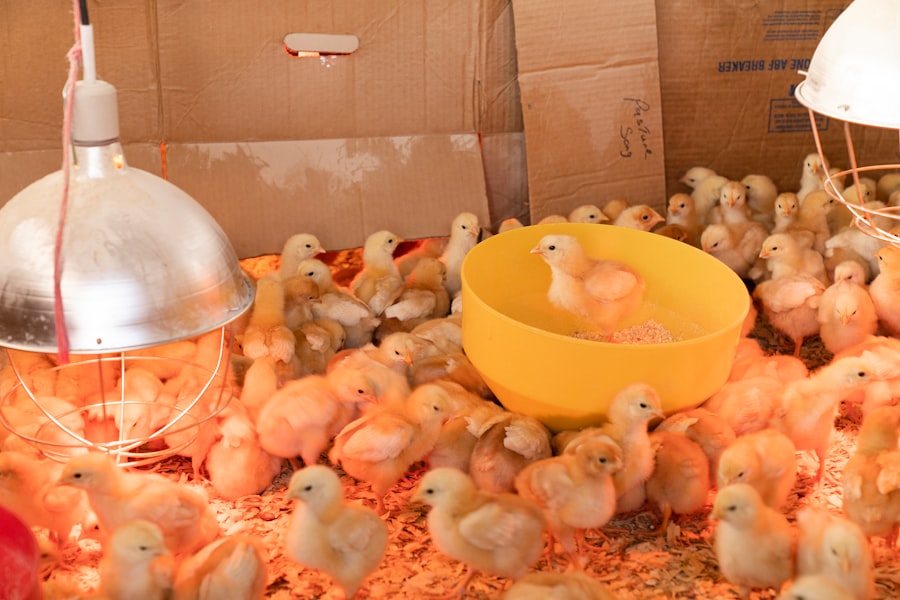Keeping chickens in your backyard has become a growing trend in recent years. More and more people are realizing the benefits of having these feathered friends as part of their daily lives. Whether it’s for fresh eggs, companionship, or natural pest control, there are numerous reasons why keeping chickens in your backyard can be a rewarding experience.
Key Takeaways
- Keeping chickens in your backyard has numerous benefits, including fresh eggs, natural pest control, and fertilizer for your garden.
- Before starting your backyard chicken operation, it’s important to understand local laws and regulations regarding zoning, noise, and odor.
- Zoning laws and property size requirements vary by location, so be sure to research and comply with your area’s regulations.
- Noise and odor regulations may also apply, so consider your neighbors and take steps to minimize any potential disturbances.
- Properly caring for your chickens involves building a suitable coop, choosing the right breed, and providing them with a balanced diet and regular veterinary care.
The Benefits of Keeping Chickens in Your Backyard
One of the most obvious benefits of keeping chickens in your backyard is the access to fresh eggs. There is nothing quite like collecting eggs from your own flock and enjoying them for breakfast. Not only are they delicious, but they are also healthier than store-bought eggs. Chickens that are allowed to roam freely and eat a natural diet produce eggs that are higher in omega-3 fatty acids and vitamins.
In addition to the practical benefits of fresh eggs, chickens can also make great pets. They have unique personalities and can be quite entertaining to watch. Many chicken owners find that their birds become part of the family, with each one having its own quirks and behaviors. Chickens can also be surprisingly affectionate, often enjoying being held and petted by their owners.
Another benefit of keeping chickens in your backyard is natural pest control. Chickens love to eat insects, making them excellent at keeping your yard free from pests like ticks, fleas, and mosquitoes. They will happily scratch and peck at the ground, devouring any bugs they come across. This can be especially beneficial for those who live in areas with high mosquito populations or have issues with ticks.
Understanding Local Laws and Regulations
Before you decide to keep chickens in your backyard, it is important to understand the local laws and regulations regarding poultry keeping. Each city or town may have its own set of rules that dictate how many chickens you can have, where they can be kept, and what kind of structures you need to have in place.
Failure to follow these laws and regulations can result in fines or even having your chickens taken away. It is important to do your research and make sure you are in compliance with all local ordinances before bringing chickens into your backyard.
Zoning Laws and Property Size Requirements
Zoning laws and property size requirements are often the first things to consider when keeping chickens in your backyard. In urban areas, there may be restrictions on the number of chickens you can have or even a complete ban on poultry keeping. In rural areas, there may be more lenient regulations, allowing for larger flocks.
Property size requirements can also vary depending on where you live. Some areas may require a certain amount of space per chicken, while others may have no specific size requirements. It is important to check with your local zoning office to determine what the rules are for your specific area.
Noise and Odor Regulations
Noise and odor regulations are another important consideration when keeping chickens in your backyard. Chickens can be noisy, especially when they are laying eggs or feeling threatened. Some cities have specific noise ordinances that limit the amount of noise that can be generated by poultry.
Odor can also be a concern, especially if you have a large flock or do not properly manage their waste. It is important to keep the coop clean and regularly remove any droppings to minimize odor. Additionally, using proper bedding materials and providing adequate ventilation can help reduce odors.
Health and Safety Concerns

Keeping chickens in your backyard comes with its own set of health and safety concerns. Chickens can carry diseases such as salmonella, avian influenza, and Newcastle disease, which can be transmitted to humans. It is important to practice good hygiene when handling chickens and their eggs, such as washing your hands thoroughly after touching them.
In terms of safety, it is important to provide a secure coop and run to protect your chickens from predators. This can include installing fencing, using secure latches on doors, and providing adequate lighting. Regularly inspecting the coop for any signs of damage or weakness is also important to ensure the safety of your flock.
Building Your Own Chicken Coop
Having a proper chicken coop is essential when keeping chickens in your backyard. It provides shelter, protection from predators, and a place for your chickens to lay their eggs. There are many different types of chicken coops available, ranging from small and simple to large and elaborate.
If you are handy and enjoy DIY projects, building your own chicken coop can be a rewarding experience. There are numerous plans and designs available online that can guide you through the process. When building your own coop, it is important to consider factors such as ventilation, insulation, and ease of cleaning.
Choosing the Right Breed of Chicken
When it comes to choosing the right breed of chicken for your backyard, there are several factors to consider. Some breeds are better suited for egg production, while others are known for their meat quality. Some breeds are more docile and friendly, while others are more flighty and independent.
It is important to research different breeds and determine which ones will best meet your needs and preferences. Consider factors such as egg production, temperament, size, and cold or heat tolerance. Additionally, consider whether you want a breed that is good for meat production or if you are primarily interested in egg-laying.
Feeding and Caring for Your Chickens
Feeding and caring for your chickens properly is essential for their health and well-being. Chickens require a balanced diet that includes a mix of grains, protein, fruits, vegetables, and calcium. Commercial chicken feed is readily available and provides all the necessary nutrients for your flock.
In addition to feeding them a proper diet, it is important to provide fresh water at all times and regularly clean their waterers. Chickens also require a clean and dry living environment, so regularly cleaning the coop and replacing bedding is necessary. Providing them with access to a dust bath is also important for their overall health and hygiene.
Conclusion and Final Thoughts
Keeping chickens in your backyard can be a rewarding experience that provides fresh eggs, companionship, and natural pest control. However, it is important to understand and follow the local laws and regulations regarding poultry keeping. Zoning laws, noise and odor regulations, and health and safety concerns should all be considered before bringing chickens into your backyard.
Building a proper chicken coop, choosing the right breed of chicken, and providing proper care and nutrition are all essential for the well-being of your flock. By following these guidelines and being a responsible chicken owner, you can enjoy the many benefits of keeping chickens in your backyard.
If you’re considering keeping chickens in your backyard, you may also be interested in learning about the incubation period for goose eggs. Poultry Wizard has a helpful article that explains what the incubation period is for goose eggs and provides valuable insights into the hatching process. Understanding this information can be beneficial if you plan on breeding geese alongside your chickens. To read more about it, check out their article on what is the incubation period for goose eggs. Additionally, if you’re curious about how many eggs geese lay, Poultry Wizard has another informative article that covers this topic. You can find it at how many eggs do geese lay. Lastly, if you’re looking for a suitable chicken coop design, Poultry Wizard offers insights into an A-frame chicken coop that may be of interest to you. Discover more about it in their article on A-frame chicken coop.
FAQs
What are the laws regarding keeping chickens in your backyard?
The laws regarding keeping chickens in your backyard vary depending on your location. Some cities and towns have specific regulations and ordinances that dictate how many chickens you can keep, where they can be kept, and what kind of enclosures are required.
Do I need a permit to keep chickens in my backyard?
In some areas, you may need a permit to keep chickens in your backyard. Check with your local government to see if a permit is required in your area.
How many chickens can I keep in my backyard?
The number of chickens you can keep in your backyard varies depending on your location. Some cities and towns have specific regulations that dictate how many chickens you can keep. In general, most areas allow between 3-6 chickens.
What kind of enclosure do I need for my backyard chickens?
The type of enclosure you need for your backyard chickens depends on your location and the number of chickens you have. In general, you will need a secure coop that provides shelter from the elements and predators, as well as a fenced area for your chickens to roam.
What kind of care do backyard chickens require?
Backyard chickens require daily care, including feeding, watering, and cleaning their coop and enclosure. They also need regular veterinary care to stay healthy.
What are the benefits of keeping chickens in your backyard?
Keeping chickens in your backyard can provide a source of fresh eggs, as well as fertilizer for your garden. They can also be entertaining pets and can help control pests in your yard.
Meet Walter, the feathered-friend fanatic of Florida! Nestled in the sunshine state, Walter struts through life with his feathered companions, clucking his way to happiness. With a coop that’s fancier than a five-star hotel, he’s the Don Juan of the chicken world. When he’s not teaching his hens to do the cha-cha, you’ll find him in a heated debate with his prized rooster, Sir Clucks-a-Lot. Walter’s poultry passion is no yolk; he’s the sunny-side-up guy you never knew you needed in your flock of friends!







